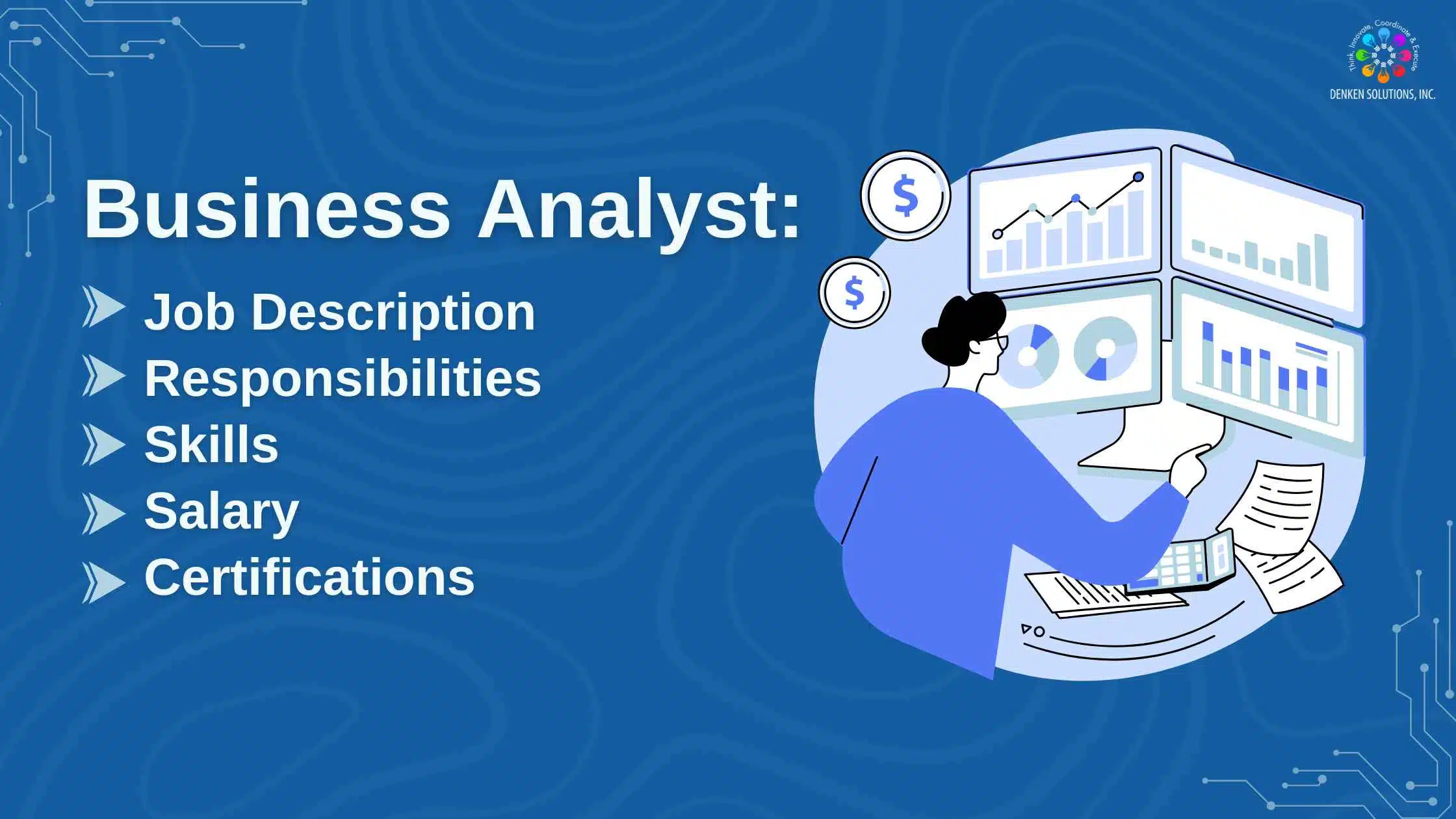To assess procedures, determine needs, and present data-driven reports and recommendations to executives and stakeholders, a business analyst uses data analytics. In order to close the gap between IT and business, this is essential. Anyone who wants to work in this fascinating field must have a solid understanding of the “business analyst job description”. This article will provide a thorough overview of the business analyst job description along with details on expected pay, necessary skills, and key duties and responsibilities.
Who is a business analyst?
By serving as a liaison between IT teams and business stakeholders, a business analyst performs a vital function in an organization. Their main duty is to apply data analytics to understand business processes, identify areas for improvement, and devise strategies to increase output and efficiency. Business analysts gather and analyze data, model business processes, and provide insights and suggestions to decision-makers. They play a crucial role in ensuring that technological solutions support business objectives and facilitate strategic planning and decision-making. This position requires a special combination of analytical skills, problem-solving abilities, and the ability to communicate complex information in a clear and useful manner.
Job description of a business analyst:
Companies seeking a business analyst seek a detail-oriented and analytical candidate to join their team. In order to ensure that business objectives are met effectively, the ideal candidate will bridge the gap between technology and business needs by analyzing processes, identifying opportunities for improvement, and working closely with stakeholders to define requirements, develop data-driven insights, and support the implementation of strategic initiatives.
Responsibilities of a business analyst:
According to their line of work, business analysts have specific duties and obligations. Business analysts play a crucial role in promoting organizational performance because they may guarantee that solutions are in line with strategic goals by having a well-defined scope for their work. The following are some of the main duties of a business analyst:
- Collecting requirements and its evaluation:
One of the most important aspects of a business analyst’s job is gathering and assessing business requirements. The business analyst works closely with stakeholders, including department heads, end users, and upper management, to understand their needs and document them. This process is essential for defining the project’s scope and making sure that the solutions that are the result meet business objectives.
- Modeling and process improvement:
Another crucial area of attention for business analysts is process improvement. To illustrate how tasks are carried out, they use flowcharts or diagrams to map out current business processes. Finding inefficiencies, bottlenecks, or redundancies is a crucial component of business analysts’ responsibilities when optimizing operations.
- Communication and stakeholder management:
For business analysts, communication skills are essential. By bridging the gap between IT departments and business teams, the experts make sure that technological solutions meet business requirements. For example, the business analyst makes sure that the technological specs match business needs when a marketing team wants a new customer relationship management (CRM) system.
- Testing and implementation of the solution:
Following the development of a solution, the business analyst frequently supervises its implementation, which involves developing test strategies to make sure the solution functions as planned. This is a crucial duty included in a lot of business analyst positions. For example, when a new software application is being released, the Business Analyst collaborates closely with the reliable QA vendor to establish testing standards and assess if the program satisfies the requirements.
- Gap analysis:
Comparing the intended future state with the current company systems and processes is another primary responsibility of business analysts. A key component of the analyst job profile is identifying these gaps, which enables business analysts to suggest changes that will advance the organization’s objectives. A business analyst could evaluate current marketing techniques and point out areas that need improvement, for instance, if a company wants to grow its market share.
- Risk management:
Any company initiative needs risk management, and business analysts are frequently in charge of spotting and reducing possible hazards. You can control project risks and guarantee project success by having corporate project risk management abilities. A business analyst evaluates the risks of suggested modifications by taking into account elements including stakeholder resistance, technical viability, and operational disturbance.
Skills of a business analyst:
Both hard and soft talents are necessary for the role of business analyst. Pulling, analyzing, and reporting data trends, sharing that information with others, and applying it to business objectives and requirements are all skills that business analysts must possess. If a business analyst has a general awareness of how systems, products, and tools operate, they may not necessarily need to have an IT experience. On the other hand, some business analysts are interested in moving from IT into this hybrid function even if they have a strong IT background and minimal business experience. Business analysts may benefit from having substantial experience in either sector, as the position frequently serves as a liaison between the company’s IT and business divisions.
However, some of the most important skills include:
- Excellent oral and written communication skills
- Interpersonal and consultative skills
- Facilitation skills
- Analytical thinking and problem-solving abilities
- Being detail-oriented and capable of delivering a high level of accuracy
- Organizational skills
- Knowledge of the business structure
- Stakeholder analysis
- Requirements engineering
- Cost-benefit analysis
- Processes modeling
- Understanding of networks, databases, and other technology
Important business analyst’s certifications:
In today’s data-first world, the function of a business analyst (BA) has grown in importance. By serving as a liaison between business requirements and technology, business analysts make sure that initiatives and projects are in line with an organization’s strategic objectives. An official acknowledgment from a professional organization that certifies your expertise in business analysis is known as a business analyst certification. It demonstrates your capacity to close the gap between technological solutions and business requirements, guaranteeing that initiatives complement an organization’s strategic objectives. In addition to helping professionals show their dedication to their careers and further professional growth, these certifications are intended to establish industry standards.
- ECBA (Entry Certificate in Business Analysis)
- PMI-PBA (Professional in Business Analysis)
- CCBA (Certification of Capability in Business Analysis)
- BCS Certificate in Business Analysis Practice
- BCS International Diploma in Business Analysis
- DataCamp Data Analyst Certification
Salary of a business analyst:
In the United States, a business analyst typically makes $97,492 annually or $46.87 per hour. Most experienced workers earn up to $132,774 annually, while entry-level roles start at $77,384. With an average pay that is 16% greater than the national average, New York has the highest-paid BAs. Second place goes to Washington, D.C., where reported earnings are 12% higher than the national average; third place goes to Houston, where annual income is 4% higher.
Why should you choose Denken Solutions to apply for the business analyst position?
Denken Solutions specializes in matching exceptional business analysts with leading organizations that respect strategic insights and data-driven decision-making. Through our extensive industry knowledge, solid employer relationships, and individualized career counseling, we make sure you get the best job that fits your goals and skill set. Whether you prefer contract, full-time, or remote work, we provide you with access to exclusive job openings, competitive compensation, and opportunities for career growth. With our experience, we guarantee a smooth and legal work experience regardless of the type of employment. To explore and apply for suitable Business Analyst positions, candidates can visit the Denken Solutions job section and find exclusive opportunities that match their skills and career goals.Let us confidently support you as you progress in your career as a business analyst by applying with Denken Solutions today!



